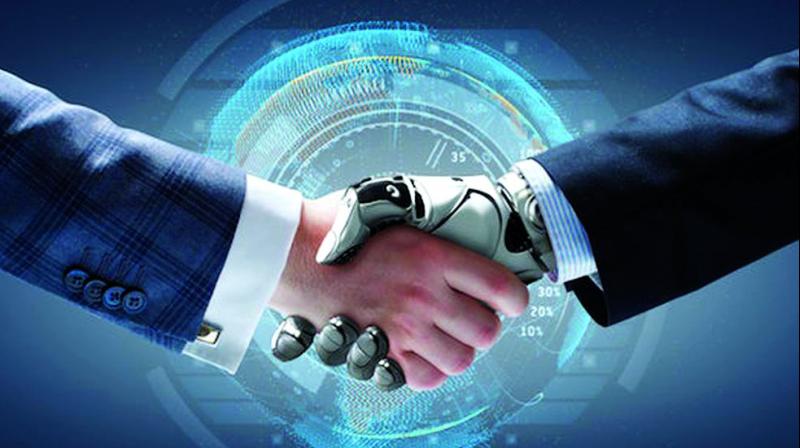Digitising workplace: Why it needs AI
AI is neither the beginning nor the end of the digital transformation, it is an important component of the end-to-end digital revolution.

Digital Transformation is never been just following a concept blindly. Today, it’s about setting a grand stage — coupled with even larger business strategies. However, to steer an organisation towards success in the digital age, it’s all dependent on how new technologies can be leveraged.
While digitisation today is focussed on automating business processes to drive customer satisfaction and operational efficiencies; in true essence, it goes well beyond.
A highly structured framework is needed lay the foundation for a strong engagement platform for the digitised ecosystem — across enterprise landscape, addressing customer and employee needs. With new technologies and concepts taking shape every day, it’s only logical to predict Artificial Intelligence (AI) taking the centre stage to drive next level digital transformation.
As high-tech as it sounds, AI as a concept has been around for more than 60 years. Alan Turing first mentioned it in his paper “Computing Machinery and Intelligence” where he suggested considering the question ‘can machines think?’. Simply put, AI is nothing but developing computer systems to make them perform tasks that usually require human intelligence. This involves tasks like speech recognition, visual perception, and decision making among others.
Sound familiar?
According to a research by Gartner, “CIOs have a major role to play in preparing businesses for the impact that artificial intelligence (AI) will have on business strategy and human employment.” Gartner also predicts that by 2022, smart machines and robots may replace highly trained professionals in tasks within medicine, law and IT.”
Essentially, it is also important to understand that AI is neither the beginning nor the end of the digital transformation. In fact, it is an important component of the end-to-end digital revolution. Currently, businesses have the unique opportunity of being at the helm of this shift within their industry, provided they align with the imperatives of the digital world. In the healthcare sector, this can be particularly be well implemented by the means on electronic patient records management systems.
It is also critical to understand that AI is an umbrella of related technologies, including natural language processing (improving interactions between computers and human or “natural” languages); machine learning (computer programs that can “learn” when exposed to new data) and expert systems (software programmed to provide advice) – that help machines analyze and actions in ways similar to the humans. These technologies are behind innovations such as virtual agents, identity analytics, and recommendation systems which have already transformed the ways in which companies look at the overall customer experience across various industries, e.g. BFSI is on the forefront of adopting these technologies.
Companies like Xerox have already applied their research in AI, machine learning, and natural language processing into their products. Xerox WDS Virtual Agent taps into intelligence gleaned from terabytes of data that the company keeps about real customer interactions. The AI can understand, diagnose, and solve customer problems — without being specifically programmed to give rote responses.
In not too distant future, AI will eventually replace many routine functions of the IT organisation, particularly on the operations side, such as in system administration, help desk, project management and application support. With advances in artificial intelligence technology, machines will successfully emulate human cognition.
However, acknowledging that the Artificial Intelligence engines we create shouldn’t work in isolation but instead, work with Human Intelligence – considering its strength, not a weakness. Where the challenge lies in how these man-machine collaborative systems communicate to be successful. They each need to express their needs and expectations. They also need to guide each other. The possibilities are endless in the India market; imagine healthcare virtual agents with the ability to diagnose ailments based on video-feeds of the patient or a virtual banker that is able to walk first-time homebuyers through the complexities of mortgages, and answer their specific questions with answers that are directly and explicitly relevant to their circumstances.
In financial services, jobs such as loan origination and insurance claims adjustment could be automated. However, while AI will hit employment numbers in some industries, many others will benefit as AI and automation handle routine and repetitive tasks, leaving more time for the existing workforce to improve service levels, handle more challenging aspects of the role and even ease stress levels in some high-pressure environments.
There’s even a very positive vibe in the India start-up community regarding AI. Today’s entrepreneurs realise how AI and in essence machine learning can help businesses get an edge over the competition and delivering better services. What’s more exciting is this journey towards seamless integration of artificial and human intelligence has in fact already started and in due course of time others would follow suit.
—by Ritesh Gandotra, Director - Global Services Business ( South Asia), Xerox Corporation
Click on Deccan Chronicle Technology and Science for the latest news and reviews. Follow us on Facebook, Twitter.

